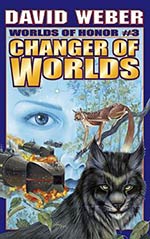
![]() Sable Aradia
Sable Aradia
2/5/2016
![]()
Okay, to be fair I started this book a fair bit of time ago, read about two and a half of the four novellas in it, and then my partner decided to read it and hid it on me. I found it again a month ago or so but wanted to finish reading the book I was on before I went back to this one.
These are some very well-written stories, and because they lack the usual Weber info-dumps, they're among the best written Honor Harrington stories I have yet to read. And I have to warn you, unlike many short stories that center around an ongoing novel series, you kind of have to read these or some things will make no sense to you in the later books.
Fortunately this will almost universally be a pleasure. The first story, "Ms. Midshipwoman Harrington," is a direct homage to "Mr. Midshipman Hornblower," which is wonderful since the Horatio Hornblower books are part of what inspired Weber to write this series in the first place, and why it's such wonderful space opera. Here we get to see Honor Harrington, great captain and admiral, as a mere midshipwoman on her "snotty" cruise. Lots of action, typical Navy politics... wonderful stuff for any Honor Harrington fan.
The second story, "Changer of Worlds," provides some wonderful insight into the ways of the other major intelligent species of the Honorverse; the treecats, who are not just cute telepathic kitties. No indeed.
The third story, "From the Highlands," introduces us to some other major characters in the Honorverse and what they're up to; including Victor Cachat, Peep intelligence agent, Anton Zilwicki, the world's most unlikely Manticoran Navy intelligence officer; Cathy Montaigne, renegade Liberal eventually to be a force to be reckoned with in Manticoran politics; and the Ballroom, a secret terrorist organization of escaped slaves dedicated to wiping out slavery by whatever means necessary. Oh yes, and Zilwicki's daughter Helen, a force to be reckoned with on her own. This story, written by Eric Flint, is full of his subtle humour, sharp wit, and clever plot and counterplot elements. It reads just like a spy thriller with some comedy thrown in. Great stuff!
The only story I thought we could have done without was the last one, "Nightfall." This was basically what happened when Secretary of War McQueen took on the Secretary of State Saint-Just just before the end of "Ashes of Victory." I suspect it was originally included but Weber's editor, in a rare act of prudence, cut it and told him it wasn't necessary. I agree; it wasn't necessary. Since we already read how it started, and we already knew how it ended, and it was just a lot of pain and bloodshed in between, and we didn't learn anything about any of the characters or the events, I don't see the point of it.
So; three out of four great stories ain't bad. Well worth reading, anyway.